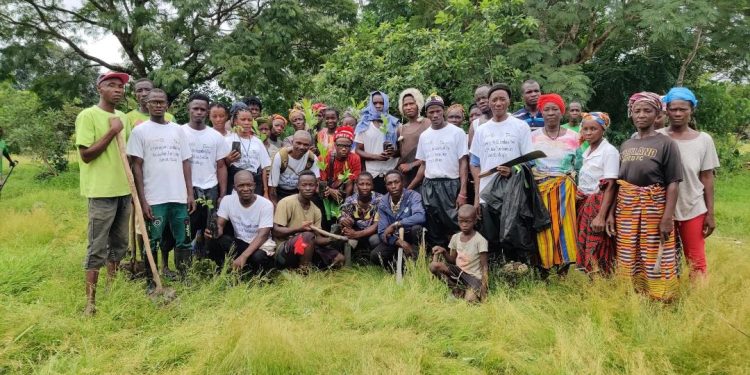Written by: Foday S. Bangura
In the northwest of Sierra Leone, near the Republic of Guinea’s border, the Outamba Kilimi National Park stands as a critical sanctuary for a myriad of species, from the elusive western chimpanzee to the majestic forest elephants. However, this vital ecosystem is under severe threat from illegal mining, rampant timber logging, poaching, and encroachment, jeopardizing not only its rich biodiversity but also the livelihoods of local communities. In response, a critical tree planting initiative has emerged, promising to restore the park’s lush landscapes and revitalize its ecological balance. This effort, implemented by Tacugama with support from EUCORD, not only aims to combat environmental degradation but also offers a dual benefit: creating employment opportunities through sustainable cash crops and fostering a burgeoning ecotourism sector. By showcasing the inherent value of their natural resources, this initiative seeks to engage and empower local communities, ensuring the park’s preservation for future generations while securing its role as a beacon of biodiversity and economic opportunity.
Top of Form Bottom of Form
On the 20th July 2024, a large reforestation initiative took form, and community members from 11 different villages helped to plant trees, of a variety of species including: Tamerined, Cashewnut, Techtonia, Pawpaw, Lenge, Acacia, Moringa, Orange, Melina, Mango, Chericapose, and Locust. All of these are economic trees which can help community members with livelihood support with the aim of deterring destructive practices that harm the environment. Each community has planted more than 6,000 different types of tree species and as a result to further sensitization efforts, are more willing to pay attention to the protection of the forest and the environment at large from all illegal activities such as bush fire, deforestation, poaching, timber logging and mining. According to Pa Alimamy Momoh Kamara, the section chief from Ganya, the work Tacugama is doing is useful in the landscape, as tree planting is regenerating the degraded areas around the communities and it helps conserve the natural environment. The section chief continued to say that, this is the first time communities in this landscape have ever received livelihood support like this before.
The tree nursery and planting created employment for youths and women in the ten communities by providing them monthly stipends for nursery technicians (two per community). The roles of nursery technicians was to take care of the seedlings from the nursing, transplanting them when they were ready and watering and weeding them. Mr. Mohamed Turay, the youth leader of Fondokorie thanked the Tacugama/EUCORD project for the monthly stipends and said that these stipends and tree planting also gave hopes to the people of Tambaka that Tacugama is here to work for them. Tambaka is one of the underdeveloped Chiefdoms in the region, struggling to develop economically, therefore the people of Tambaka are fully ready to work with Tacugama and their donors as they are in need of financial opportunities. The operational communities are Tompary, Komoya, Salakunda, Karamokosoriya, Longurie, Ganya, Kankuya, Fondokhorie, Tugukuray, Baritha, and Ferehkuray are the eleven communities targeted by the TCS/ EUCORD project. The planting of trees is extremely important and it also encourages a thriving habitat for wild animals and in the long term will reduce the chances of wild animal and human conflict, if there is more habitats for animals to live in
The stakeholders in Tambaka both upper and lower Tambaka including males and females supported the tree planting activities and not only the planting but the provision of human support for the protection of all the tree planting sites in the various communities. Chairlady from Tompary says the effort of Tacugama has accelerated high women’s empowerment in Tambaka Chiefdom by supporting the women with Village Savings and Loans Association (VSLA) under the EUCORD project. With all these, as women leaders, we are ready to support the project. The forest initiative is good “because without a forest, there will be no rain without rain there will be no farming activities”.













